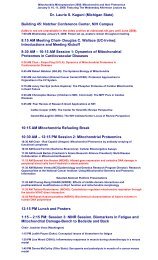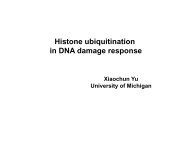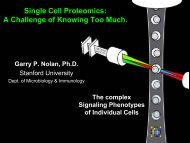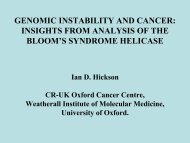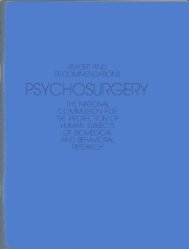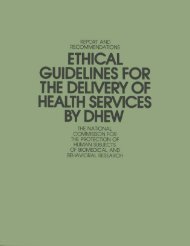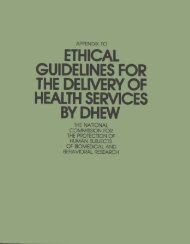RESEARCH ON THE FETUS - National Institutes of Health
RESEARCH ON THE FETUS - National Institutes of Health
RESEARCH ON THE FETUS - National Institutes of Health
You also want an ePaper? Increase the reach of your titles
YUMPU automatically turns print PDFs into web optimized ePapers that Google loves.
DISSENTING STATEMENT OF<br />
COMMISSI<strong>ON</strong>ER DAVID W. LOUISELL<br />
I am compelled to disagree with the Commission's Recommendations (and<br />
the reasoning and definitions on which they are based) ins<strong>of</strong>ar as they succumb<br />
to the error <strong>of</strong> sacrificing the interests <strong>of</strong> innocent human life to a postulated<br />
social need. I fear this is the inevitable result <strong>of</strong> Recommendations (5) and<br />
(6). These would permit nontherapeutic research on the fetus in anticipation <strong>of</strong><br />
abortion and during the abortion procedure, and on a living infant after abortion<br />
when the infant is considered nonviable, even though such research is precluded<br />
by recognized norms governing human research in general. Although the Commission<br />
uses adroit language to minimize the appearance <strong>of</strong> violating standard norms, no<br />
facile verbal formula can avoid the reality that under these Recommendations the<br />
fetus and nonviable infant will be subjected to nontherapeutic research from<br />
which other humans are protected.<br />
I disagree with regret, not only because <strong>of</strong> the Commission's zealous<br />
efforts but also because there is significant good in its Report especially its<br />
showing that much <strong>of</strong> the research in this area is therapeutic for the individuals<br />
involved, both born and unborn, and hence <strong>of</strong> unquestioned morality when based on<br />
prudent medical judgment. The Report also makes clear that some research, even<br />
though nontherapeutic, is merely observational or otherwise without significant<br />
risk to the subject, and therefore is within standard human research norms and<br />
as unexceptional morally as it is useful scientifically.<br />
But the good in much <strong>of</strong> the Report cannot blind me to its departure from<br />
our society's most basic moral commitment: the essential equality <strong>of</strong> all human<br />
beings. For me the lessons <strong>of</strong> history are too poignant, and those <strong>of</strong> this century<br />
too fresh, to ignore another violation <strong>of</strong> human integrity and autonomy by<br />
subjecting unconsenting human beings, whether or not viable, to harmful research<br />
even for laudable scientic purposes.<br />
Admittedly, the Supreme Court's rationale in its abortion decisions <strong>of</strong><br />
1973-- Roe v . Wade and Doe v . Bolton , 310 U.S. 113, 179--has given this Commission<br />
an all but impossible task. For many see in that rationale a total negation<br />
<strong>of</strong> fetal rights, absolutely so for the first two trimesters and substantially<br />
77



